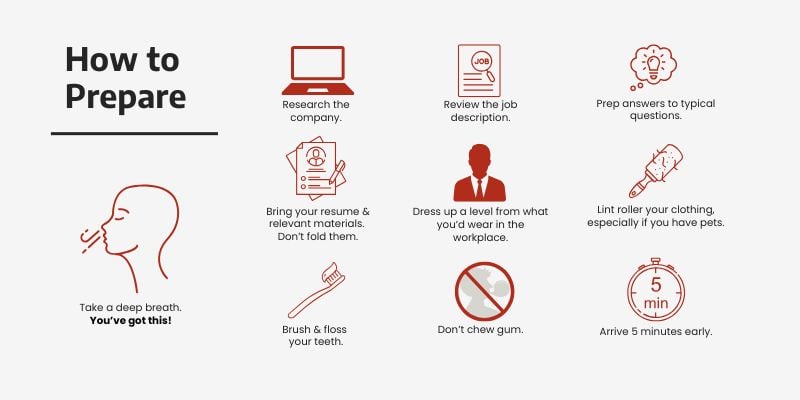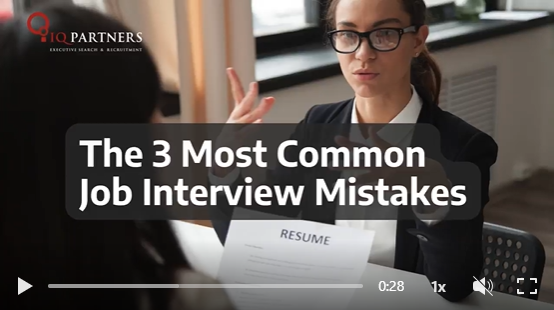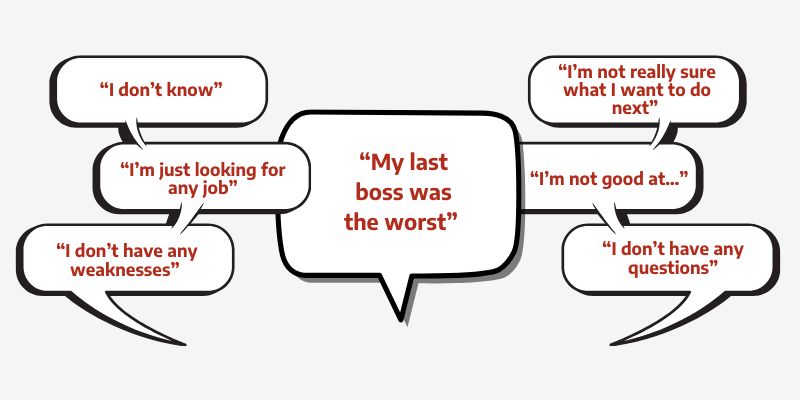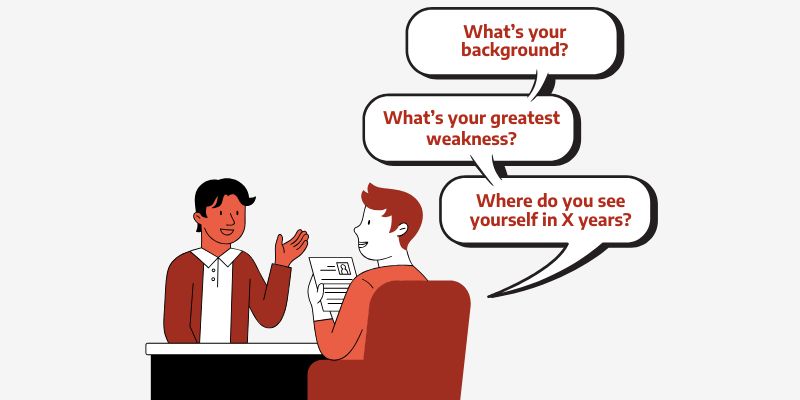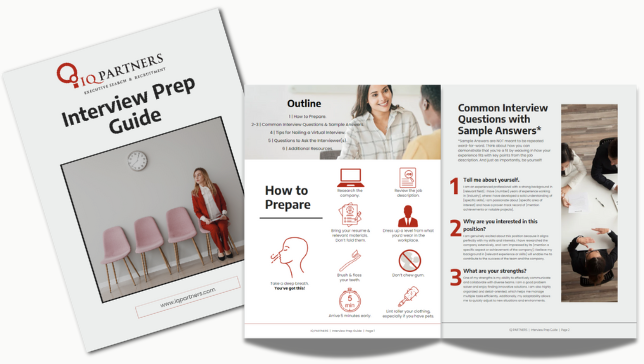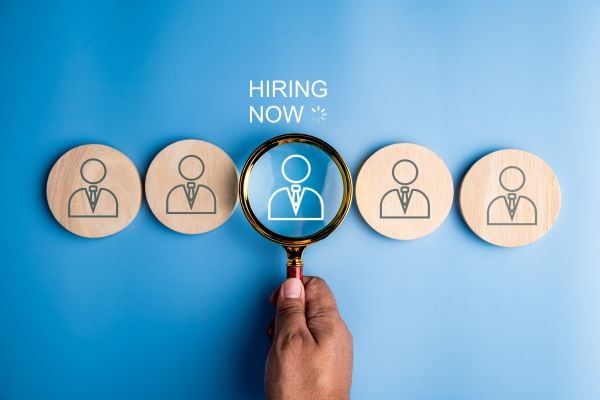Job interviews are one of the most basic parts of the hiring process. But they are also one of the most challenging to master – for candidates and employers alike. Many candidates struggle to perform their best and find interviews intimidating. Just as many employers fail to establish an interview process to help them hire the best people. Yet, both job seekers and employers want to do their best. As a top-rated recruitment agency, we can help.
We have over 20 years of recruitment experience, working on over 10,000 recruitment projects. Each of our recruiters conducts thousands of interviews each year, leading to well over 500 hires. Now, we want to pass on our experience and insights to you.
This job interview guide is the ultimate resource for job seekers and employers to prepare for job interviews. It’s packed with 103 job interview tips, insights, examples, and interview questions and answers. You can read from top to bottom or jump into the section that is your biggest pain point.
Here’s an overview of the topics covered:
- The 6 steps to prepare for a job interview + 11 tips for virtual and phone interviews
- 17 common job interview questions and answers
- 9 great questions to ask in an interview
- 5 ways to finish a job interview and leave a lasting impression
- What to do after the interview – 5 steps to follow up
- Advice for handling multiple job interviews, dropping out & other job interview situations
- Employers!: 14 questions to ask in job interviews & 10 other tips
The 6 Steps to Prepare for a Job Interview
So, you’ve successfully secured an interview. The role is appealing and you want to work for the organization. Now it’s time to prepare and present the best version of your professional self. Here’s a quick list of things to accomplish for how to prepare for a job interview:
- Research the company: Learn as much as you can about your potential employer. Review the company website, read reviews online, and if possible, speak with others with first-hand knowledge of the organization.
- Review the job description: Thoroughly review the description to ensure you are clear about the role and expectations. Think about how you are an ideal candidate to fill the position.
- Leverage technology: Technology has changed how you can prepare for job interviews, so use the tools available to you. Learn how to use ChatGPT and other AI tools to prepare for a job interview.
- Bring your resume & relevant materials: Refine your resume and customize based on the role. Make sure to print a few copies of your resume and cover letter to bring with you to the interview. Also, bring a copy of your portfolio (if applicable). Make sure not to fold or crease the papers. Bring clean copies.
- Dress up a level from what you’d wear in the workplace: As they say, dress for the job you want, not the job you have. Choose an appropriate outfit. Make sure to lint roll your clothing (especially if you have pets). Here’s some more advice for what to wear on a job interview.
- Plan your travel and route: Never be late for an interview. Use Google Maps to plan your route and know how long it will take to make it to the interview locations. Give yourself some buffer time for traffic and other delays.
Click the video above to watch The 3 Most Common Job Interview Mistakes + Follow Us on LinkedIn.
5 Insights To Prepare For A Virtual Job Interview
Even though they are as close as you’ll get to the real thing, video interviews differ slightly from in-person meetings. The main things to remember are: Maintain good eye contact, look into the camera, and display positive body language throughout your time on video. Also, make sure your backdrop is clean and clear. Here are some additional tips:
- Get Comfortable on Camera: Video interviews are quite different from in-person meetings, even though they come close to replicating the real thing. Many people experience camera shyness. If you’ve never been on camera before, it’s important to practice and get comfortable. Maintain good eye contact by looking into the camera, and display positive body language throughout the video. Also, ensure that your backdrop is clean and clear, with nothing embarrassing in the background.
- Do a Practice Run: Before the actual interview, it’s crucial to do a practice run. Check your computer, internet connection, and video tools to ensure everything is functioning properly. Confirm that your audio and video settings are correct. Arrange a mock interview with a family member or friend. Once you’ve had a successful practice session, charge your device to full power to avoid interruptions during the interview.
- Eliminate All Distractions: Barking dogs, kids, doorbells, and other distractions can disrupt your interview. Set up in a quiet location in your home, and turn off your phone and device notifications. Do your best to eliminate as many potential distractions as possible.
- Arrive Early and Dress the Part: Just as with an in-person interview, it’s important to present yourself well. Dress professionally and look your best. Since you’re interviewing from home, there’s no excuse to be late. Log on early to ensure everything is working properly.
- Have a Cheat Sheet: In a video interview, you can keep a copy of your resume and the job description beside you. You can also create a cheat sheet with the key points you want to communicate during the interview. If you get stuck, you can glance at the sheet, but avoid reading from it or looking at it for more than a few seconds. Use it only if necessary.
6 Tips To Have A Successful Phone Interview
Many of the same rules apply to phone interviews as virtual or in-person interviews. Here are some tips to have a strong phone interview:
- Put A Face To The Voice: If you have a job interview call set up, thoroughly prepare for it. Find out who you’ll be talking to and check out their LinkedIn profile. Look for common areas to discuss, such as similar companies or industry experience, mutual connections, or shared educational backgrounds.
- Have Notes In Front of You: One advantage of a phone interview is the ability to have your resume in front of you. Keep a pad of paper for notes, a list of questions to ask, the job description, and a glass of water – avoid coffee. Ensure you know the dates on your resume accurately, as getting them wrong is a common mistake.
- Eliminate Distractions: Interview in a distraction-free room. Put your phone on ‘do not disturb’. If you work from home, make sure pets are out of the room, and arrange childcare if needed to ensure you won’t be interrupted.
- Establish Time Parameters: If you’re currently employed, start by asking, “I’ve booked an hour for this meeting. Will that be sufficient?” This helps you manage the conversation and sets clear expectations for the duration.
- Stand Up & Smile: Sounds funny, right? Standing helps you maintain energy and projects a more dynamic presence, avoiding the tendency to slump in your chair.
- Be Unique: Share something interesting about yourself on a personal level. Find a relatable topic that could make the interviewer smile. Be honest about your expertise – don’t claim to be an expert if you’re not. Humility is key, especially if the interviewer is more knowledgeable in an area where you’re still a novice.
17 Common Job Interview Questions…& Sample Answers!
One of the most searched-for topics by job seekers is job interview questions and answers. Candidates want to know the types of questions they can expect to be asked. Perhaps even more important, they want to know how to answer these tough job interview questions. Even though the line of questioning will vary based on your industry and type of job, there are a series of common questions you should be prepared to answer. Some will be straightforward, while others can be tricky interview questions to answer. Here’s our list of 17 common job interview questions you can expect to get asked.
Here are the most common job interview questions and advice for how to answer them.
1. Tell me about yourself.
Many interviewers will ask the tell me about yourself type of question. They want to learn more about you.
Answer this question with a concise statement about who you are personally and professionally. Tell your professional story. Avoid just listing off information you have in your resume.
- Start your response to this question with a brief elevator pitch-style statement about who you are.
- Highlight your accomplishments
- Communicate your passion
- Tie things into the current role
- Make it clear why you are the best candidate for the job.
2. Describe your greatest weakness.
Being asked to describe your greatest weakness is not easy to do. You spend most of your time reflecting on what you are good at. But it’s one of the most common interview questions.
One thing to avoid is giving cliche responses such as “I’m too much of a perfectionist.” Don’t say you have no weaknesses (we add have some). You also don’t want to be too honest. This could raise some red flags.
Be honest about your weaknesses but also address in specific terms how you are working to overcome them. You can say something like, “In the past, I’ve struggled with [fill in the blank] and here’s how I’m overcoming it…”
3. How did you like your last employer?
Never criticize a former employer in an interview. You can express appreciation for what you learned on the job. If pressed on why you left, an appropriate answer could be that you left “to pursue a new and challenging opportunity” or “for a situation that offered more opportunities for advancement.”
4. What made you apply for this job?
Be prepared to cite several reasons why your current skill level and interests qualify you for the position. Also, provide points on why you are particularly interested in the employer, reflecting the research you have done on the organization.
5. Where do you hope to be 5 or 10 years from now?
Have a basic sense of the direction you want to take your career. The best answer is that you seek the opportunity to demonstrate your performance and hope to progress as far as dedication and intelligent work will carry you.
6. What kinds of work have you done?
Highlight skills you believe are important for the new job and cite examples of successes or unique achievements in past situations.
7. What are the most important factors you require in a job? How should it be structured to provide you with satisfaction?
Choose the things that are most important to you and tie them into the role you want. The answer can vary, for example:
- Freedom to work independently or autonomously
- Security
- Overall environment
- Team atmosphere
- Responsibilities
- Compensation
8. Describe a time when you felt ineffective, why you felt ineffective, what you did about it, and what the outcome was.
The interviewer is trying to identify desired and undesirable behaviours for the job. Failing to address parts 2, 3, and 4 of the question often indicates a short attention span and poor attention to detail.
9. What are the most satisfying aspects of your present position? What are the most frustrating aspects?
These answers should provide insight into “what makes the applicant tick.” Is the candidate results-oriented and pleased with achieving specific goals? Alternatively, have interpersonal issues like personality conflicts hindered efforts to reach objectives?
10. Has your job performance ever been appraised? How were you assessed? Give both the pluses and minuses.
The answers usually give interviewers an idea of the candidate’s honesty. While no applicant is expected to reveal major flaws, everyone has weaknesses, and failing to admit them can leave a negative impression.
11. Describe a time when you felt particularly effective.
The interviewer is more interested in how the activity is described and the behaviour shown during the explanation. If the candidate says, “I’m not sure what you want,” it may indicate a dependent trait.
12. Were your assignments handled individually or were they a team effort?
The interviewer tries to determine whether the applicant is exaggerating their influence in performing tasks and achieving results. The question seeks balance. For example, “I completed the programming for the customer response module independently. I served as a member of a task force that completed the specifications for that module.”
13. Why have you changed jobs often?
If you have moved around a lot recently, it’s important to communicate that you plan to stay long-term if hired. Address your reasons for changing jobs, but avoid spending too much time explaining each move.
14. Tell me about a time when you made a mistake at work. How did you recover from it?
Mistakes happen, and it’s okay to discuss a time when you made one. The key is to own the mistake and explain the steps you took to remedy the situation, as well as what you learned from the experience.
15. What would your colleagues/manager say about you?
Use this question to highlight your strengths. What are you good at? What do your boss or colleagues rely on you for at work? Do you have a specialization that others do not?
16. Why are you the best candidate for the job?
Focus on what you think is important to the employer. Talk about why you are a great fit and how the company would benefit from hiring you.
17. What are your compensation requirements?
The money question is always challenging to answer. The key is to know your worth. Research the typical salary for someone with your experience and job title.
Looking for other sample questions. Here’s a list of the most commonly asked job interview questions.
What Questions Should I Ask In a Job Interview? Here’s 9 Great Examples
Answering questions is only part of what you need to do during an interview. You also need to be prepared to ask the interview questions at the end of the interview. It’s imperative you ask great questions that can help show you did your research and you have a genuine interest in the position. What questions should you ask?
Here’s a list of 9 great sample interview questions to ask an employer:
1. Have I Answered All Your Questions?
This is a crucial question to ask during an interview. It gives the interviewer a chance to revisit any questions they may still have about your answers or qualifications. The way they respond can also provide insight into how well you’re doing. If they say “no,” it might indicate you’ve performed well so far. If they do have additional questions, it’s an opportunity for you to elaborate and improve your answers. It’s a win-win situation.
2. What Is the Typical Career Progression for People in This Role?
This question helps you determine if the position offers growth opportunities or if it might be a dead-end job. It provides insight into where your career could potentially go within the company.
3. How Has Your Job Changed Since You’ve Worked Here?
Asking this question gives you insights into the interviewer’s experience with the company. They may share valuable information about the company’s culture and how employees are valued.
4. Who Will I Be Working With? Who Do I Report To?
This question reveals the types and number of people you’ll be working with daily. It provides insights into your future team dynamics and helps you understand your potential manager and how your relationship with them might develop.
5. Can You Tell Me More About the Future Plans of the Department/Company?
Remember, an interview is also your opportunity to assess if this employer is the right fit for you. Understanding the company’s future strategic plans can give you a clearer picture of your potential career path. It will help you determine if the role offers opportunities for professional growth and promotion.
6. What Do You Like Most About Working for the Company? What’s the Company Culture Like?
Asking this question helps build a connection with the interviewer by showing interest in their personal experience. It also provides you with insights into the company’s culture, helping you decide if it’s a place where you’d feel comfortable and thrive.
7. How Does This Position Fit Within the Greater Context of the Department/Company?
This question gives you a better understanding of the job’s responsibilities and how your role contributes to the organization as a whole. It shows that you’re genuinely interested in the position and how it impacts the company.
8. Can You Tell Me What a Typical Day Would Be for the Role?
Learning about a typical day in the role helps you gain a clearer picture of the daily tasks and responsibilities. It demonstrates your enthusiasm for the position and helps you decide if the job aligns with your career goals and expectations.
9. What Are the Next Steps in the Interview Process
If the interview process hasn’t been outlined, it’s important to ask about the next steps. This shows your continued interest in the position and lets you know what to expect, such as another interview or a skills test. Being prepared for what comes next will help you stay on track.
5 Ways to Finish a Job Interview and Leave a Lasting Impression
All candidates want to finish an interview strong and leave a good impression. Here are five tips from Toronto recruiters to help you finish your interview off on a high note:
1. Come Prepared
A strong start will lay the foundation for a strong finish. Are you ready for the interview? Did you spend time researching the company? Do you have a genuine interest in the role? Do you have authentic answers to the questions you can expect to be asked? Coming to the interview prepared and ready to win the job will leave a good impression on the interviewer.
2. Ask Questions About the Role
If you are seriously interested in the job, you should have some questions about the role and organization. The interviewer is going to ask if you have any questions. This is your opportunity to become the interviewer and get more information about job specifics, the company culture, and other information that is important to you. Asking insightful questions shows you have a serious interest. It will also make you more memorable.
3. Have a Strong Summary Statement
A strong summary statement can help end your interview on a high note. Restate how you are qualified for the job, emphasize your strengths, and reiterate how you are the best candidate for the job. This will change the dialogue to focus on your strengths. Always close on a strong note to make yourself more memorable.
4. Ask If They Need Clarification
Important points about your skills, experience, and qualifications for the job can get muddled or miscommunicated during an interview. Asking the interviewer if they need clarification about anything allows them to circle back and get the details they need. It will also provide you with the opportunity to make a stronger statement and case as to why you are the best candidate.
5. Be Polite
This is an obvious one, but being polite to everyone you meet when interviewing for a job can go a long way. Smile, say thank you, and be engaging with everyone you meet.
What to do After the Interview – 5 Steps to Follow-up
Sending a follow-up message soon after your interview is common practice. No, following up after an interview is not outdated. It can be just what you need to secure a second interview or differentiate yourself from other interviewees. Here are some tips to follow up after a job interview:
- Send A Personalized Follow-up Message: Write a personalized message that adds to the conversations you had during the interview. Reiterate your interest in the role and offer additional information you may have forgotten to mention in the interview. Don’t bother the interviewer about their decision. If they already communicated when you can expect a decision, don’t ask them again when you follow up.
- Follow Up Sooner Than Later: Don’t wait too long to follow up. It is best if you send your message within a couple of days of the interview – 24 hours is standard.
- Use a Professional Channel to Communicate: Send your follow-up to the hiring manager’s work email. Don’t send communications regarding the job via social media, text, or contact them at their personal phone number.
- Send One Follow-up Message: There is no need to follow up multiple times. Recruiters and hiring managers are busy working through interviews and assessing candidates. Sending multiple messages could show desperation, and it also shows you do not respect their time.
- Give Time Before Checking in Again: You sent a thank you note and you hear nothing back. Wait until the initial follow-up time frame has passed. For example, if the employer says they will follow up in a week, at the minimum wait until then. Communicate that you are eager to hear from them and still interested.
Why Am I Not Getting A Call Back After An Interview? Here’s 5 Reasons
The reality is most people don’t get a call back for a second interview. If an employer didn’t get back to you, it may be one of the reasons you are not getting a call back.
- Your salary expectations are out of alignment
- There was a more qualified candidate
- You didn’t meet all the qualifications
- You failed to impress the interviewer
- Something internally changed
But, if you do get a call, here are some do’s and don’ts for nailing a second interview.
Even More Job Interview Tips and Insights…
Job interviews are vast. There are a lot of unique situations and conversations that can arise during the hiring process. Some can be challenging to navigate. Here are some quick insights from our recruiters about how to manage the following situations:
6 Insights to Manage Multiple Job Interviews
Getting interviews from multiple companies is common, especially if you’ve applied to many positions. here’s how to manage this situation:
- It is perfectly okay to interview for multiple jobs at the same time
- Understand the timelines and hiring decision process for each company. know when a firm decision has to be made.
- Avoid making any false or misguided statements about your intentions. don’t commit if you are not ready to make a final decision.
- Assess your options carefully – compare all factors – compensation, opportunity, fit, work-life balance.
- Make a decision and commit to it.
- Notify the other employer.
Deeper insights: What NOT to Do When Interviewing For Multiple Jobs. 6 Things To Avoid
4 Strategies to Discuss Being Fired From Your Previous Job
Getting fired is not ideal for anyone. Talking about it during an interview can be awkward but you need to address the situation head-on. Here’s how:
- Don’t lie about being fired
- Take ownership – don’t blame others
- Treat the situation as a learning moment
- Discuss what you’ve done to improve since
Deeper insights: You’ve Been Fired. What Do You Say In Job Interviews?
Shhh! 7 Things You Shouldn’t Say In A Job Interview
There are some things you just should say to a prospective employer. Here’s a list of things you should never say during a job interview:
Deeper insights: 7 Phrases That Are Interview Killers
The 4 Best Ways To Drop Out Of An Interview
So, the job is not for you. It happens. Job interviews are a two-way street. Sometimes you’ll find a role or employers are just not what you are looking for. Dropping out of an interview is okay. But, you should do it the right way. Here’s how:
- Make an informed decision
- Don’t ghost the employers
- Inform the hiring manager immediately
- Choose the right method of communication
Deeper insights: How to Drop Out of a Job Interview Gracefully
14 Job Interview Tips For Employers: How To Ask The Right Questions
Asking the right questions is essential to learn as much as possible about candidates. Interviewers only have a short amount of time to learn about, assess, and compare candidates. There is no time for asking questions that will not help you with your hiring decisions. The types of questions you ask will dictate the type of information you get from candidates.
There are questions candidates want to answer. They are ready for them. But as an interviewer, you want to ask questions candidates don’t expect. And there are questions you can ask to catch candidates off-guard.
Here is a list of the 14 best Interview questions to ask candidates and why you should ask them:
1. What Is The First Challenge You Want To Tackle If You Get The Job?
This question helps you gauge how well the candidate understands the company, the role, and the areas where they can contribute most effectively. It also gives you insight into the impact they intend to make and where they plan to focus their efforts from the start.
2. Which Skills Do You Need To Improve?
Everyone has areas for growth. By asking this question, you encourage candidates to reflect on their skills and identify where they could benefit from additional professional development. Strong candidates will provide an honest answer, demonstrating self-awareness and a willingness to improve.
3. How Does Your Current Job Prepare You For This One?
This question reveals what the candidate currently does in their role and prompts them to think critically about how their experience has equipped them to handle the challenges of the new position.
4. Tell Us Something About This Job That Scares You.
This is a valuable question to ask when a candidate is advancing in their career, such as moving into a senior management role for the first time. It helps you identify any potential skills or experience gaps and gain insights into areas that might be outside of their comfort zone.
5. What Are You Watching/Listening To/Reading Right Now?
Candidates enjoy discussing their interests, so ask them what they’re currently into. Whether it’s a Netflix show, a podcast, or a book, you can learn a lot about their personality and interests. It can also provide insight into how much they value professional development and self-improvement.
6. What Is the Next Big Trend?
Everyone has ideas about the next big thing. Asking this question allows you to see how the candidate thinks about trends. Are they focused on technology, finance, or perhaps something specific to your industry? Their answer can reveal a lot about their perspective and interests.
7. What Is the Most Memorable Thing About You?
This question prompts candidates to reflect on their strengths and self-awareness. By asking what is most memorable about them, you encourage them to highlight something significant about their personal or professional life.
8. How Would Your Last Boss Describe You Using Only One Word?
Describing oneself in one word is challenging, especially when considering how a former boss might describe you. This question tests the candidate’s quick thinking and self-perception and can lead to some interesting responses.
9. What Have You Learned From Failure?
Instead of asking the common question about weaknesses, ask candidates what they’ve learned from failure. This open-ended question allows them to share a personal or professional experience and reveals how they handle setbacks. Pay attention to whether they provide a specific example and how they frame their learning.
10. What Made You Decide to Make a Career Move Right Now?
This is an insightful question for candidates who have recently left a job. It delves into their motivation for leaving and can reveal if they were unhappy with their previous role or if they’re seeking growth. Understanding their reasons helps you assess if your company is the right fit for their next career step.
11. What Is the Most Important Thing You Want in a New Job?
Asking this question helps you understand what a candidate is seeking in their next role. It’s crucial to determine if there’s a good match between what your company offers and the candidate’s expectations. For example, if they prioritize remote work and you don’t offer it, there may be a mismatch.
12. Where Do You Go To Read Up On The Latest Trends, Tips, And Ideas?
It’s important to hire candidates who are invested in their profession. This question reveals whether they stay current with industry developments and actively seek out new knowledge.
13. What’s The Biggest Decision You’ve Had To Make In The Past Year?
This question provides insight into how a candidate approaches decision-making. It helps you understand their thought process and the kinds of challenges they’ve faced.
14. Tell Me About A Time You Made A Big Mistake.
Everyone makes mistakes, and this question tests a candidate’s self-awareness. Look for individuals who take responsibility for their errors and learn from them, rather than those who deflect blame or offer insincere examples.
3 Ineffective Job Interview Questions You Should Stop Asking Candidates
There are some useless interview questions. These are the ones that don’t provide you with any value. Here are the top 3 interview questions to stop asking:
1. What’s your background?
This is information you already have – that is if you’ve read their resume and checked out their LinkedIn profile. Asking a general question like this will likely result in the candidate simply rehashing the information that is on their resume.
2. What’s your greatest weakness?
All candidates are ready for this one. You have likely been asked this question in one of your job interviews in the past. Do you expect a candidate to answer this question with anything less than, “I’m a perfectionist” or another similar response?
There is no value in asking this question because you don’t get a real answer. Plus, you don’t usually learn much about a candidate other than their ability to come up with a strong prepared answer for this question.
3. Where do you see yourself in X years?
This is becoming an increasingly impossible question to answer. People are changing jobs and advancing their careers at a much faster rate than in the past. Plus, the pandemic has made it challenging to predict what will be happening in a couple of years, let alone a couple of months from now. 10 years from now there is a good chance candidates will be in a job that didn’t previously exist.
How To Identify The Pretenders – 7 Signs of Unqualified Candidates
An interviewer’s ability to detect interview lairs can have a significant impact on your hiring practices. The ability to weed out unqualified candidates can help you improve recruiting success and save you time. There are things you should never hear in an interview from candidates. The following are some red flags:
- Candidates getting anxious, start fidgeting with things, or you see a change in their posture.
- A sudden change in tone. This is a sign they could be lying.
- Rambling and not having a clear response to a question.
- Repetition – liars tend to repeat words and phrases.
- A change in the candidate’s pitch could vary when they are lying.
- Negativity about past colleagues, managers, and employers.
- Excessive jargon.
Conclusion
Job interviews are a fundamental aspect of the hiring process for both candidates and employers. While essential, interviews can also be one of the most challenging steps, often intimidating candidates and posing difficulties for employers who may struggle to conduct effective interviews. Despite these challenges, both parties aim to succeed. That’s why our recruitment team created this comprehensive job interview guide. Use the above tips, advice, and insights to become better interviewers and interviewees and improve the hiring process for all parties.

